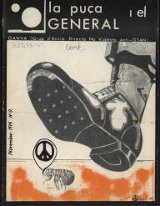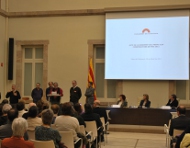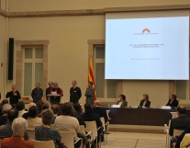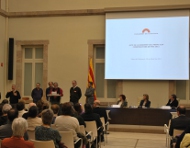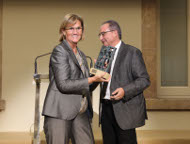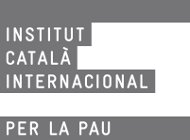ICIP has promoted the digitalization of the most emblematic magazines edited by associations and institutions belonging to the Catalan Peace Movement with the aim of disseminating a very little known and difficult to access corpus, due to its special characteristics –apart from the publishing houses- and to its fragmentation through the Catalan territory.
The project has been possible thanks to the collaboration of the Library of Catalonia, which impulses a digitalization project of the Catalan newspaper and magazine patrimony known as the ‘Antique Catalan Magazine Archive’ (ARCA): a unique web portal of magazine periodical collections (preferably complete) which were representative of the Catalan culture and society on the local, national or international ambits.
On this first phase of the project, ICIP selected the most significant magazines of the period so that it was possible to locate and find the complete collections, digitalize and habilitate them so that they are accessible to the public.
These publications are the following: Diari de la pau, En peu de pau, En pie de paz, Mocador, La pau: diari de la pau, Pax and La puça i el general.Contents are available on ICIP website.
In order to disseminate the project, ICIP will organize a public event next Tuesday October 29th, which will count with the participation of the lecturer on Contemporary History of the Universitat Autònoma de Barcelona and expert on the Catalan Peace Movement, Martí Marin, and the director of the Newspaper Library of the Library of Catalonia, M. del Tura Molas. Guifré Miquel, responsible of the ICIP Library will also participate in the event.
Author: whads
ICIP Peace in Progress Award 2013, pending resolution
Last Saturday June 29th closed the official deadline to submit proposals for the ICIP Peace in Progress Award 2013 which, again in this edition, aims to publicly recognize individuals, entities or institutions that, in an outstanding and extensive manner, have worked and contributed to the promotion and building of peace.
The ICIP Board of Governors is the organ in charge of evaluating the proposals submitted and granting the Award. The winner of the 2013 edition will be announced next September 21st, coinciding with the celebrations of the International Day of Peace.
The ICIP Peace in Progress Award consists of public recognition, a sculpture created by the Nobel Peace Prize winner, artist and activist, Adolfo Pérez Esquivel, called Porta del sol, and 4,000 euros.
The former editions of the Award recognized the struggle of the conscientious objectors and insubmisos (people who refuse to do military service or any substitute social work) symbolized in Pepe Beunza, and the fight of the ‘Madres de Soacha’ for peace and human rights in Colombia.
ICIP recognizes the struggle of conscientious objectors and insubmisos in an emotional event at the Catalan Parliament
On February 29th the International Catalan Institute for Peace (ICIP) awarded the First ICIP Peace in Progress Award to the group of conscientious objectors and insubmisos who opposed compulsory military service, in an emotional ceremony at the Catalan Parliament. Various representatives, relatives and friends of the group, along with representatives of the peace movement and political parties were present at the event.
The award recognizes the work of conscientious objectors and insubmisos “in representing a long and diverse struggle against compulsory military service, which contributed to the deepening of democracy and to spreading the values of a culture of peace.” By rejecting the use of arms, the group also spread the values of “conscientious objection, civil disobedience and the nonviolent resolution of conflicts.”
Appeal to continue struggling
The ICIP Peace in Progress Award was presented to Pepe Beunza, first conscientious objector for ideological reasons in Spain, in 1971, who was accompanied by four other representatives of the movement: Jordi Agulló, who was the second conscientious objector; Jaume Llansó, insubmís; Ramon Panyella, president of Moviment per la Pau (Movement for Peace) – formerly the Association of Conscientious Objectors; and Martí Olivella, member of the first group of conscientious objectors of Can Serra.
Pepe Beunza thanked ICIP for its recognition and evoked, in his speech, “the 30 years of a tough nonviolent campaign for conscientious objection”, which involved one million conscientious objectors and 30,000 insubmisos. He recalled that “there are still countries, such as Greece and Turkey, where conscientious objectors are persecuted and imprisoned”, and he called for a “culture of peace, based on cooperation, generosity and compassion”, as opposed to a “predatory and capitalist culture of death”. And he called upon the audience to continue struggling. “We have gone from a Francoist dictatorship to an international financial dictatorship which we must also oppose […]. We must continue because social gains do not last forever. We can see how we are losing improvements in health care, education, social services, etc. of what was the beginning of a society of well-being; improvements that were obtained after a long struggle and many sacrifices.” Beunza also stated that “it is necessary to promote peace organizations to build a more just and peaceful society and to create nonviolent peace forces”.
Recognition for a just cause
José Luis Gordillo, professor of Philosophy of Law at the University of Barcelona, also participated in the event. He defined Beunza as the “patriarch” of the movement of conscientious objectors and insubmisos. In his speech, Gordillo pointed out “the extremely important contributions made by the group of conscientious objectors and insubmisos to the culture of peace and to the culture of democracy in our country”. Among these contributions, he highlighted the recognition of the right to object to compulsory military service, the dissemination of a culture of peace in Spanish society, the normalization of public criticism of the armed forces as an institution, and the abolition of compulsory military service by strictly nonviolent means, through civil disobedience.
In the closing ceremony, the president of the Parliament, Núria de Gispert, congratulated the group of conscientious objectors and insubmisos for their years of struggle, and highlighted “the courage, generosity and coherence – of Pepe Beunza—in support of a just cause”, recalling that, as a result of his act, he was court-martialled twice, spent 15 months in prison, and 18 months more in a disciplinary battalion in the Western Sahara.
The president of the Parliament also underlined the contribution of the ICIP Award in the dissemination of a culture of peace, the power of words and dialogue to resolve conflicts. She recalled that a special edition of this award was presented to the Parliament of Catalonia in October 2011 for “representing and symbolizing, as the maximum exponent of sovereignty emanating from the people of Catalonia, the continuity and legacy of the institutions, in which pacts, dialogue and the peaceful solution of controversies have strong roots”.
ICIP commitment
The ICIP Peace in Progress Award is conferred annually and was created to publicly recognize individuals, groups or entities that have worked for or contributed to the promotion of peace in a significant and extensive manner. The award consists of an honorific distinction, public recognition and a sculpture created by the Nobel Peace Prize winner, activist and artist, Adolfo Pérez Esquivel, called Porta del Sol.
Director Tica Font stated that, along with the First ICIP Peace in Progress Award, ICIP is committed to “preserving, as much as possible, the memory and historic legacy of the various individuals and organizations that were part of the movement of conscientious objectors and insubmisos”. In order to do so, ICIP will promote the gathering of oral testimonies, the publication of works about the people and organizations, the compilation and public dissemination of documents and publications of the movement, and the dissemination, through the ICIP website, of works and documents of the time, related to conscientious objection, nonviolence and civil disobedience.
ICIP recognizes the struggle of conscientious objectors and insubmisos in an emotional event at the Catalan Parliament
On February 29th the International Catalan Institute for Peace (ICIP) awarded the First ICIP Peace in Progress Award to the group of conscientious objectors and insubmisos who opposed compulsory military service, in an emotional ceremony at the Catalan Parliament. Various representatives, relatives and friends of the group, along with representatives of the peace movement and political parties were present at the event.
The award recognizes the work of conscientious objectors and insubmisos “in representing a long and diverse struggle against compulsory military service, which contributed to the deepening of democracy and to spreading the values of a culture of peace.” By rejecting the use of arms, the group also spread the values of “conscientious objection, civil disobedience and the nonviolent resolution of conflicts.”
Appeal to continue struggling
The ICIP Peace in Progress Award was presented to Pepe Beunza, first conscientious objector for ideological reasons in Spain, in 1971, who was accompanied by four other representatives of the movement: Jordi Agulló, who was the second conscientious objector; Jaume Llansó, insubmís; Ramon Panyella, president of Moviment per la Pau (Movement for Peace) – formerly the Association of Conscientious Objectors; and Martí Olivella, member of the first group of conscientious objectors of Can Serra.
Pepe Beunza thanked ICIP for its recognition and evoked, in his speech, “the 30 years of a tough nonviolent campaign for conscientious objection”, which involved one million conscientious objectors and 30,000 insubmisos. He recalled that “there are still countries, such as Greece and Turkey, where conscientious objectors are persecuted and imprisoned”, and he called for a “culture of peace, based on cooperation, generosity and compassion”, as opposed to a “predatory and capitalist culture of death”. And he called upon the audience to continue struggling. “We have gone from a Francoist dictatorship to an international financial dictatorship which we must also oppose […]. We must continue because social gains do not last forever. We can see how we are losing improvements in health care, education, social services, etc. of what was the beginning of a society of well-being; improvements that were obtained after a long struggle and many sacrifices.” Beunza also stated that “it is necessary to promote peace organizations to build a more just and peaceful society and to create nonviolent peace forces”.
Recognition for a just cause
José Luis Gordillo, professor of Philosophy of Law at the University of Barcelona, also participated in the event. He defined Beunza as the “patriarch” of the movement of conscientious objectors and insubmisos. In his speech, Gordillo pointed out “the extremely important contributions made by the group of conscientious objectors and insubmisos to the culture of peace and to the culture of democracy in our country”. Among these contributions, he highlighted the recognition of the right to object to compulsory military service, the dissemination of a culture of peace in Spanish society, the normalization of public criticism of the armed forces as an institution, and the abolition of compulsory military service by strictly nonviolent means, through civil disobedience.
In the closing ceremony, the president of the Parliament, Núria de Gispert, congratulated the group of conscientious objectors and insubmisos for their years of struggle, and highlighted “the courage, generosity and coherence – of Pepe Beunza—in support of a just cause”, recalling that, as a result of his act, he was court-martialled twice, spent 15 months in prison, and 18 months more in a disciplinary battalion in the Western Sahara.
The president of the Parliament also underlined the contribution of the ICIP Award in the dissemination of a culture of peace, the power of words and dialogue to resolve conflicts. She recalled that a special edition of this award was presented to the Parliament of Catalonia in October 2011 for “representing and symbolizing, as the maximum exponent of sovereignty emanating from the people of Catalonia, the continuity and legacy of the institutions, in which pacts, dialogue and the peaceful solution of controversies have strong roots”.
ICIP commitment
The ICIP Peace in Progress Award is conferred annually and was created to publicly recognize individuals, groups or entities that have worked for or contributed to the promotion of peace in a significant and extensive manner. The award consists of an honorific distinction, public recognition and a sculpture created by the Nobel Peace Prize winner, activist and artist, Adolfo Pérez Esquivel, called Porta del Sol.
Director Tica Font stated that, along with the First ICIP Peace in Progress Award, ICIP is committed to ���preserving, as much as possible, the memory and historic legacy of the various individuals and organizations that were part of the movement of conscientious objectors and insubmisos”. In order to do so, ICIP will promote the gathering of oral testimonies, the publication of works about the people and organizations, the compilation and public dissemination of documents and publications of the movement, and the dissemination, through the ICIP website, of works and documents of the time, related to conscientious objection, nonviolence and civil disobedience.
ICIP recognizes the struggle of conscientious objectors and insubmisos in an emotional event at the Catalan Parliament
On February 29th the International Catalan Institute for Peace (ICIP) awarded the First ICIP Peace in Progress Award to the group of conscientious objectors and insubmisos who opposed compulsory military service, in an emotional ceremony at the Catalan Parliament. Various representatives, relatives and friends of the group, along with representatives of the peace movement and political parties were present at the event.
The award recognizes the work of conscientious objectors and insubmisos “in representing a long and diverse struggle against compulsory military service, which contributed to the deepening of democracy and to spreading the values of a culture of peace.” By rejecting the use of arms, the group also spread the values of “conscientious objection, civil disobedience and the nonviolent resolution of conflicts.”
Appeal to continue struggling
The ICIP Peace in Progress Award was presented to Pepe Beunza, first conscientious objector for ideological reasons in Spain, in 1971, who was accompanied by four other representatives of the movement: Jordi Agulló, who was the second conscientious objector; Jaume Llansó, insubmís; Ramon Panyella, president of Moviment per la Pau (Movement for Peace) – formerly the Association of Conscientious Objectors; and Martí Olivella, member of the first group of conscientious objectors of Can Serra.
Pepe Beunza thanked ICIP for its recognition and evoked, in his speech, “the 30 years of a tough nonviolent campaign for conscientious objection”, which involved one million conscientious objectors and 30,000 insubmisos. He recalled that “there are still countries, such as Greece and Turkey, where conscientious objectors are persecuted and imprisoned”, and he called for a “culture of peace, based on cooperation, generosity and compassion”, as opposed to a “predatory and capitalist culture of death”. And he called upon the audience to continue struggling. “We have gone from a Francoist dictatorship to an international financial dictatorship which we must also oppose […]. We must continue because social gains do not last forever. We can see how we are losing improvements in health care, education, social services, etc. of what was the beginning of a society of well-being; improvements that were obtained after a long struggle and many sacrifices.” Beunza also stated that “it is necessary to promote peace organizations to build a more just and peaceful society and to create nonviolent peace forces”.
Recognition for a just cause
José Luis Gordillo, professor of Philosophy of Law at the University of Barcelona, also participated in the event. He defined Beunza as the “patriarch” of the movement of conscientious objectors and insubmisos. In his speech, Gordillo pointed out “the extremely important contributions made by the group of conscientious objectors and insubmisos to the culture of peace and to the culture of democracy in our country”. Among these contributions, he highlighted the recognition of the right to object to compulsory military service, the dissemination of a culture of peace in Spanish society, the normalization of public criticism of the armed forces as an institution, and the abolition of compulsory military service by strictly nonviolent means, through civil disobedience.
In the closing ceremony, the president of the Parliament, Núria de Gispert, congratulated the group of conscientious objectors and insubmisos for their years of struggle, and highlighted “the courage, generosity and coherence – of Pepe Beunza—in support of a just cause”, recalling that, as a result of his act, he was court-martialled twice, spent 15 months in prison, and 18 months more in a disciplinary battalion in the Western Sahara.
The president of the Parliament also underlined the contribution of the ICIP Award in the dissemination of a culture of peace, the power of words and dialogue to resolve conflicts. She recalled that a special edition of this award was presented to the Parliament of Catalonia in October 2011 for “representing and symbolizing, as the maximum exponent of sovereignty emanating from the people of Catalonia, the continuity and legacy of the institutions, in which pacts, dialogue and the peaceful solution of controversies have strong roots”.
ICIP commitment
The ICIP Peace in Progress Award is conferred annually and was created to publicly recognize individuals, groups or entities that have worked for or contributed to the promotion of peace in a significant and extensive manner. The award consists of an honorific distinction, public recognition and a sculpture created by the Nobel Peace Prize winner, activist and artist, Adolfo Pérez Esquivel, called Porta del Sol.
Director Tica Font stated that, along with the First ICIP Peace in Progress Award, ICIP is committed to ���preserving, as much as possible, the memory and historic legacy of the various individuals and organizations that were part of the movement of conscientious objectors and insubmisos”. In order to do so, ICIP will promote the gathering of oral testimonies, the publication of works about the people and organizations, the compilation and public dissemination of documents and publications of the movement, and the dissemination, through the ICIP website, of works and documents of the time, related to conscientious objection, nonviolence and civil disobedience.
Conscientious objectors and insubmisos, ICIP Peace in Progress Award 2011
The ICIP Peace in Progress Award Prize 2011 recognized the collective of objectors and insubmisses of conscience of the compulsory military service “in representing a long and diverse struggle against conscription, which contributed to the deepening of democracy and to the spread of the values of the culture of peace, as well as popularizing, with the rejection of the use of weapons, conscientious objection, civil disobedience and the nonviolent resolution of conflicts”.
The award ceremony took place in February 2012 at the Palace of the Parliament of Catalonia. He received the award, on behalf of the group, Pepe Beunza, the first conscientious objector to the compulsory military service for ideological reasons of the Spanish State in 1971, accompanied by four other representatives of the movement: Jordi Agull., who was the second conscientious objector; Jaume Llans., insubmissive; Ramon Panyella, president of the Movement for Peace – the former Association of Conscience Objectors; and Mart. Olivella, member of the first group of Can Serra objectors.
Catalan Parliament, ICIP Peace in Progress Award 2011 (extraordinary edition)
The Governing Board of ICIP granted an extraordinary edition of the 2011 ICIP Peace in Progress Award to the Parliament of Catalonia for “representing and symbolizing, as the finest example of the sovereignty emanating from the people of Catalonia, the continuity and legacy of the institutions, customs and practices of our ancestors, in which consensus, dialogue and peaceful resolution of disputes are deeply rooted.”
The award ceremony took place in the auditorium of the Parliament of Catalonia in October 2011 during the ceremony commemorating the 40th anniversary of Pau Casals’ speech to the United Nations General Assembly. The event featured the participation of the president of the Pau Casals Foundation, the abbot of the monastery of Santa Maria de Montserrat, Josep M. Soler.
ICIP Peace in Progress Award 2011
In order to provide recognition for the work done by individuals and organisations that have made a significant contribution in the field of promoting and building peace, the International Catalan Institute for Peace (ICIP) annually awards the ICIP Peace in Progress Award. The award, which will be granted for the first time in 2012, consists of an honorary distinction public recognition and the sculpture Puerta del Sol created by Nobel Price winning artist Adolfo Pérez Esquivel.
Nomination Process
Nominations, which will be accepted in English, Catalan and Spanish, may be submitted by public or private non-profit organizations and should be received by 1 November 2011 in order to qualify for the 2012 award. Please ensure to thoroughly read the award criteria and to submit all required information to the nomination form before sending in your nomination both electronically (icip@gencat.cat) and in hard copy (Diagonal 409, 6th floor, 08008, Barcelona, Spain).
ICIP extraordinary award
Please note that, in addition to the annual ICIP Peace in Progress Award, the ICIP Board of Governors has decided that awards may also be granted on an extraordinary basis. The first extraordinary award has been granted to the Parliament of Catalonia for representing and symbolizing the continuity and legacy of two institutions created by the people of Catalonia in order to make the ideal of peace a reality: the Peace and Truce of God, and the Consulate of the Sea. The award ceremony will take place in the Parliament of Catalonia on 24 October 2011, in commemoration of the 40th anniversary of the legendary speech by Pau Casals to the United Nations, in which he expressed his gratitude for being awarded the UN Peace Medal and after which he performed El cant dels ocells (The Song of the Birds).
Contact
For more information please contact ICIP staff at (0034) 93 554 42 70 or send an email to icip@gencat.cat

